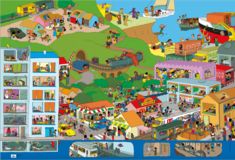
Détails du jeu
Si vous avez joué à ce jeu, aidez-nous à informer les autres en donnant votre avis.
N'hésitez pas à partager vos commentaires et aidez les autres à choisir les bons jeux. Dites-nous comment cela s'est passé et comment les enfants ont réagi? Ou avez-vous des conseils pour les autres joueurs, une variante amusante, une amélioration possible?
![]()
Nous apprécions beaucoup vos efforts dans la rédaction de la critique.
Détails du jeu
Détails du jeu
Détails du jeu
Visitez le profil de ARSIS- Association for the Social Support of Youth
Connectez-vous ou inscrivez-vous pour ajouter à vos favoris
Cookies enregistrés